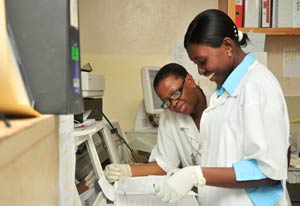The Fogarty International Center, part of the U.S. National Institutes of Health, supports basic, clinical and applied research and training for U.S. and foreign investigators working in the developing world. Since its formation more than 40 years ago, Fogarty has served as a bridge between NIH and the greater global health community - facilitating exchanges among investigators, providing training opportunities and supporting promising research initiatives in developing countries. Over the last four decades, about 5,000 scientists worldwide have received significant research training through Fogarty Programs.

Today, Fogarty funds some 400 research and training projects involving more than 100 U.S. universities. View current Fogarty grants by program. The U.S. scientists, in turn, collaborate with colleagues in numerous foreign countries, most of them in the developing world. Fogarty also convenes the best scientific minds around the world to address critical global health research problems such as polio eradication, the impact of climate change on disease outbreaks and strengthening research capacity in Africa.
Fogarty’s four divisions work together to support global health research and training programs that improve health and generate data and concepts to guide national and international global health policies - including analyses of social, ethical and economic issues.
Training researchers, at home and abroad
Fogarty's Division of International Training and Research (DITR) administers research grants, training grants and fellowship programs at sites in more than 100 countries. Fogarty programs that build the research pipeline are anchored to peer-reviewed research grants and designed to be collaborative, long term and flexible. Nearly a quarter of Fogarty awards are made directly to robust research institutions in the developing world. The remaining grants support scientists at U.S. institutions who collaborate with colleagues abroad. About one-third of Fogarty’s grants focus on scientific discovery, and two-thirds support research training.
Planning for future global health needs
The Division of International Science Policy, Planning and Evaluation (DISPPE) provides strategic guidance to Fogarty’s director on the development, analysis and evaluation of Fogarty’s programs and on international science policy issues. The division tracks activities of international funding agencies and research trends in global health. The division also advises Fogarty’s director on legislative and partnership matters and manages the Center’s involvement in the Disease Control Priorities Project.
Encouraging research through diplomacy
The Division of International Relations (DIR) develops new partnerships among U.S. scientists, institutions and counterparts abroad to advance research and training in the biomedical and behavioral sciences. The division works on behalf of Fogarty and the whole of NIH to identify opportunities for collaboration with foreign science-funding agencies, the U.S. Department of State, U.S. technical agencies and international organizations. It forms agreements with other nations to establish research collaborations and commitments for home country support for foreign researchers returning from NIH fellowships to facilitate their successful re-entry.
Predicting and analyzing disease outbreaks
Fogarty’s in-house scientists in the Division of International Epidemiology and Population Studies (DIEPS) conduct research on the epidemiology and mathematical modeling of infectious diseases. Primary concentrations include cross-national studies of mortality patterns with special emphasis on influenza, vector-borne diseases and vaccine-preventable diseases. Since 2000, these scientists, with collaborators in more than 24 countries, have produced research used to guide domestic and international policy in the development of countermeasures for potential bioterror agents and public health measures to control the spread of infectious diseases.